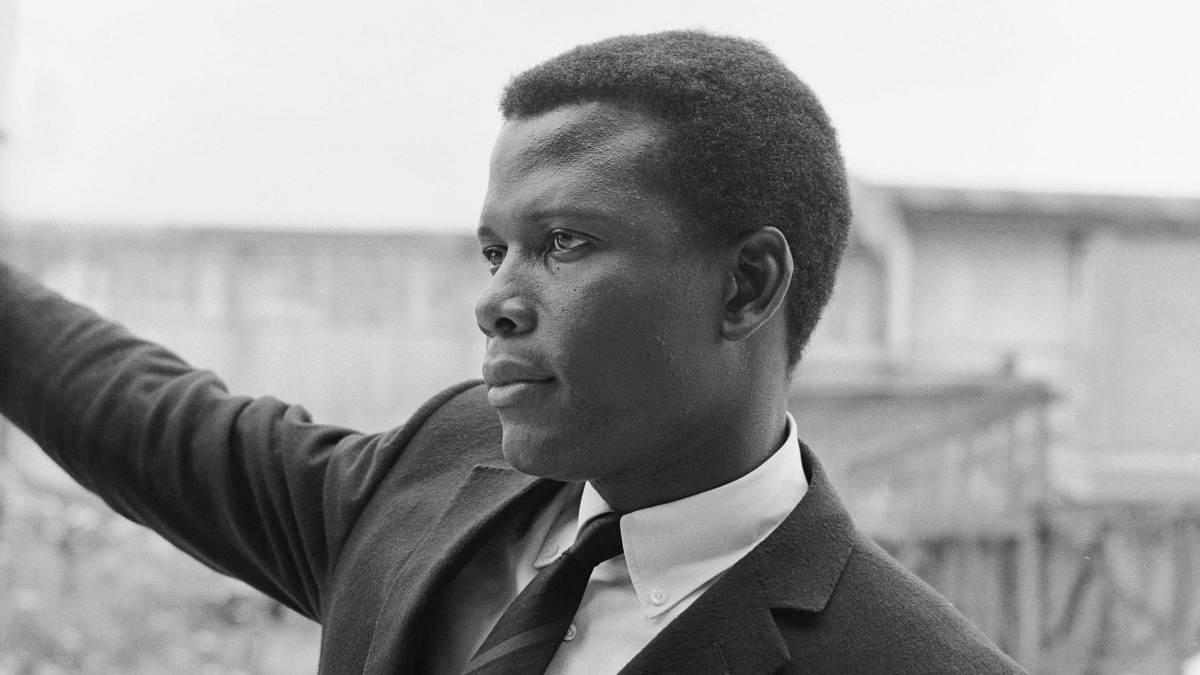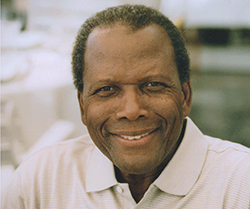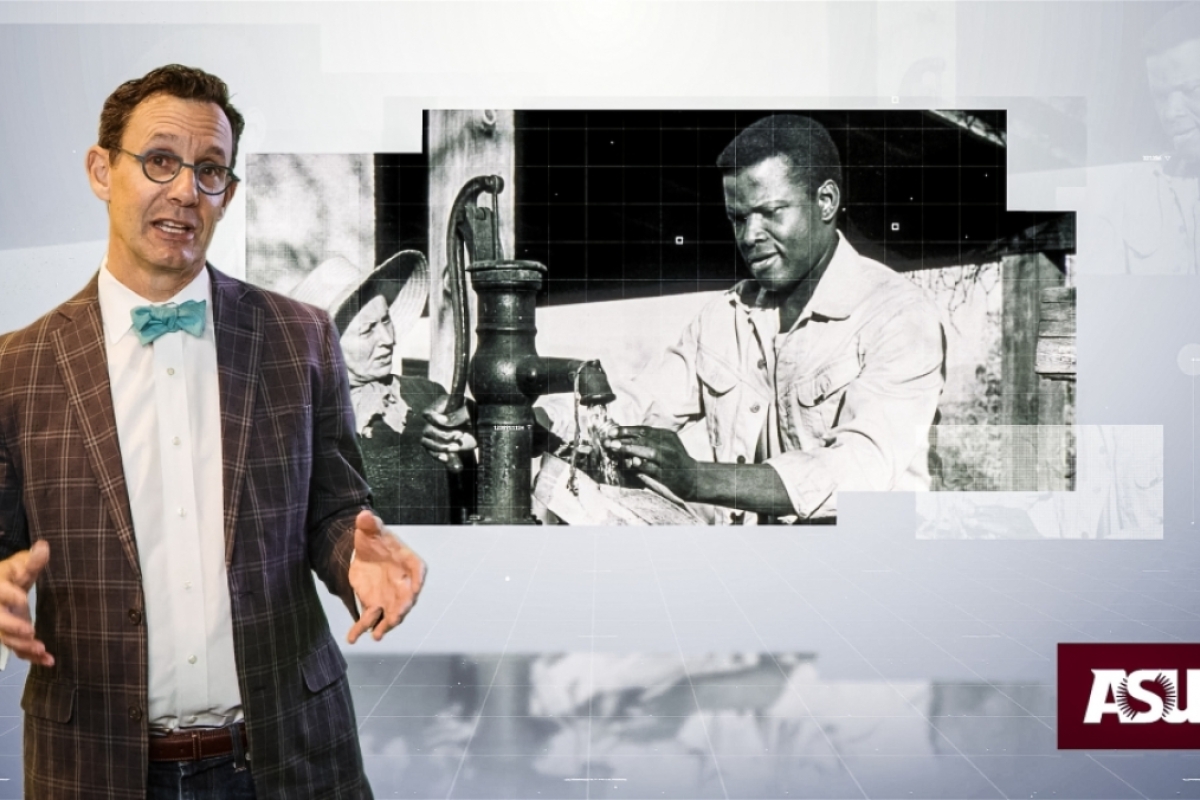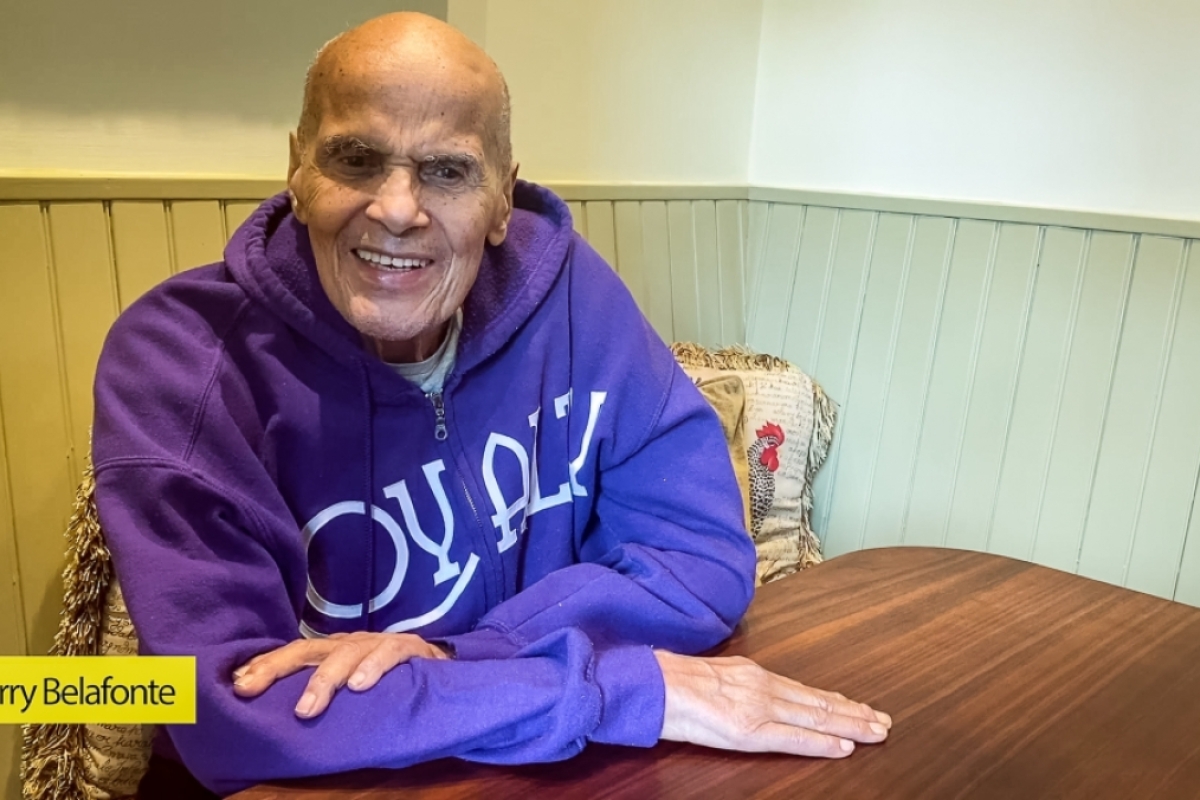ASU names film school after trailblazing actor and filmmaker Sidney Poitier
Move is part of a commitment to diversity in storytelling and storytellers

Editor’s note: This story is featured in the 2021 year in review.
Arizona State University has renamed its film school after Hollywood icon Sidney Poitier, the first Black man to win the Academy Award for best actor.
The move signifies the university’s commitment to inclusivity and diversity, according to ASU President Michael Crow.
“Arizona State University is deeply committed to the premise of inclusivity, and The Sidney Poitier New American Film School is an extension of that impact in an area of academic pursuit that will be advanced by representation of greater diversity and perspective,” he said.
“What we’re doing here is not just recognizing Sidney Poitier for his lifetime of achievements and his legacy, but naming our New American Film School for a person that embodies that which we strive to be — the matching of excellence and drive and passion with social purpose and social outcomes, all the things his career has stood for.”
The Sidney Poitier New American Film School, with nearly 700 students, is one of five schools in the Herberger Institute for Design and the Arts at ASU. The school will soon add two locations besides its current home on the Tempe campus: a new state-of-the-art facility in downtown Mesa that will be completed in fall 2022 and that will be the primary home for the film school, and ASU’s new center in downtown Los Angeles that will open later this year.
Poitier, who is now 93, is known for breaking racial barriers and embodying characters with dignity and wisdom. He won the Oscar for his role in the 1963 film “Lilies of the Field,” which was set and filmed in Arizona. He also was the first Black actor nominated for a best actor Academy Award for the 1958 movie “The Defiant Ones.”

Sidney Poitier was the first Black performer to win the Oscar for best actor, for 1963's "Lilies of the Field."
Many of Poitier’s movies addressed race, starting with “No Way Out,” a 1950 film in which he played a doctor who had to treat two white racists. In 1967 alone, he starred in three hit movies dealing with racial tensions: “To Sir, with Love,” “Guess Who's Coming to Dinner” and “In the Heat of the Night.”
He later went on to direct several movies, including “Uptown Saturday Night” and “Stir Crazy.”
Poitier, who grew up in the Bahamas before moving to the United States, served as the Bahamian ambassador to Japan from 1997 to 2007.
“Sidney Poitier is a national hero and international icon whose talents and character have defined ethical and inclusive filmmaking,” said Steven J. Tepper, dean of the Herberger Institute for Design and the Arts at ASU.
“His legacy will serve as a guide and inspiration for our school and the thousands of film students we educate.”
The school naming was revealed during a celebration video that was released Monday, featuring remarks by many in the ASU community, film industry icons and three of Poitier’s six daughters.
Beverly Poitier-Henderson said: “It’s fitting that ASU is embracing his work ethic and embracing his commitment to truth and his commitment to the arts and his commitment to education. We’re very happy. He’s very happy.”
Poitier-Henderson talked about how her father was often mobbed by fans when he went out, which was not always appreciated by his daughters when they were young. Once, the family was at Disneyland and when fans started to crowd around, asking, “Is that Sidney Poitier?” his annoyed daughters said, “No, he just looks like him.”
Their father discovered what they were doing and told them to stop.
“He told us that these were the people who put us and him where he was, so we had to respect that,” she said.
Anika Poitier is a director and actor.
“It’s really important to have diversity in the stories that we tell, and they need to be told by the people who are living these stories — and that’s a huge problem in this industry,” she said.
“There are so many stories about Black people and brown people and women that are not told by the people who have lived these stories, and to deny their perspective is dangerous.”
Anika Poitier said she hopes The Sidney Poitier New American Film School will encourage students to tell their stories and provide a platform to share them.
“Because I think that it’s what the world needs desperately right now.”
Sydney Poitier Heartsong, an actor and producer, said that her father wanted Black people to have opportunities in all aspects of the film industry.
“I know at the time, the thing that angered him the most was that he was the only one. He was the only one standing up there. He was the only one with an Academy Award. And he fought so that others could be included as well,” she said.
“He wanted to see his story and his likeness represented on the screen, and he was also keenly aware of the fact that that wasn’t going to fully happen, in the way that it should, unless there were people also behind the camera.”
Several current ASU film students also spoke on the video, describing how important it is for people to tell their own stories.

According to his daughter Sydney Poitier Heartsong, the two most important things to Sidney Poitier are education and the arts, a marriage found at ASU's film school.
Serena Hoskyns said that once she was on campus, she knew she was doing what she was supposed to.
“There’s a responsibility in film,” she said. “We influence so much of the world, and with the tropes and stories and things that have been left in place, it’s time for an emerging generation to show growth.”
In the video, Michael Burns, an ASU alumnus and now the vice chairman of Lionsgate entertainment studio, said that change in the film industry is long overdue.
“I also know that this naming is more than just a moment in time. It signals a transformative cultural shift in our nation,” he said. “Sidney Poitier is a hero and a role model whose example will ignite the energies of countless students.”
Tiffany Ana López, the new vice provost for inclusion and community engagement at ASU, said that, like many students in The Sidney Poitier New American Film School, she was the first in her family to attend college.
“I understand that for so many of our students, if they can’t see it, they can’t be it,” she said.
“It’s very meaningful that this is a film school that looks, acts and works like no other, a film school now named for a historic innovator in his field, someone constantly pushing for a level of excellence that’s informed by thinking about social justice and community,” said López, the former director of the School of Film, Dance and Theatre in the Herberger Institute.
Among the celebrities on the video was actor and civil rights activist Harry Belafonte, a close friend of Poitier.
“Sidney is not only a fine artist but also a dear human being and a wonderful American citizen,” he said. “Thank you, Arizona State.”
Actor John Lithgow noted that many university institutions are named for people whose achievements have faded from memory.
“That will never happen to you, Sidney. You are one of our founding fathers,” he said.
“ASU is honoring you. But you are honoring ASU.”
Top photo of Sidney Poitier courtesy Getty Images
More Arts, humanities and education

'Devils in the Metal': ASU vet leads iron cast workshop for former service members
Bruce Ward believes everyone has a symbol of strength or resilience, and they have an obligation to find it. His happens to be a paper crane in an ocean wave. “It’s the idea that we are the…

ASU English professor wins Guggenheim Fellowship for poetry
The awards — and opportunities — keep piling up for Safiya Sinclair, an associate professor in Arizona State University’s Department of English. In mid-April, Sinclair received one of 188 Guggenheim…

Designer behind ASU’s brand named newest Herberger Institute Professor
Bruce Mau, co-founder and CEO of the Chicago-based holistic design consultancy Massive Change Network, has joined Arizona State University’s Herberger Institute for Design and the Arts as its newest…






